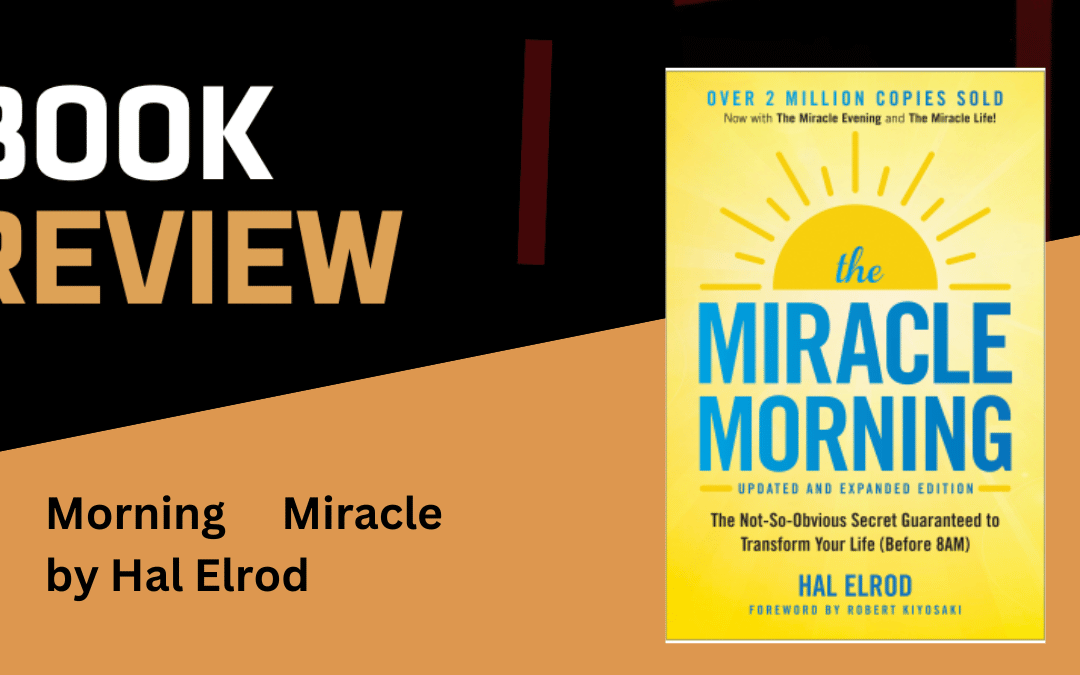Morning routines are everywhere. People talk about them as if they hold the key to success. Wake up at five. Drink lemon water. Run ten miles. Meditate. Journal. Read. Work before sunrise. It sounds impressive, almost heroic. But here is my contrarian take. Most people do not need a perfect routine to improve their life. They just need one thing that feels right.
That is why The Miracle Morning by Hal Elrod is both inspiring and flawed. It is inspiring because it gives a framework. It is flawed because it can overwhelm. Yet, even with its flaws, I see it as a book that shifts perspective in a healthy way.
The Big Idea
Elrod’s book is built on six habits. He calls them Life S.A.V.E.R.S. They are silence, affirmations, visualization, exercise, reading, and scribing. His claim is simple. If you practice them daily before the world interrupts you, you will build momentum. You will think more clearly. You will feel more in control.
I like the simplicity. I like the energy behind it. But here is the part I disagree with. Success does not require all six. For many readers, forcing every step will create guilt. They will feel like they failed if they skip one. That is not a miracle morning. That is pressure disguised as discipline.
The Strength of Small Wins
The true power of the book is not in doing six habits. It is in picking one and doing it with intention. For example, just ten minutes of silence can calm a restless mind. One page of journaling can clear mental clutter. A single affirmation can change the tone of your day.
Elrod emphasizes consistency. I agree with him there. Repetition shapes identity. But he frames it as a full routine. I see it differently. The magic lies in the smallest habit that sticks. When one habit grows strong, others often follow.
Morning as a Fresh Start
What Elrod gets absolutely right is the timing. Mornings are powerful. The mind is not yet filled with the noise of the day. Even ten minutes of focused effort early on can do more than an hour later. I have seen this in my own life. Tasks I resist in the evening feel lighter at sunrise.
But here again I part ways with his intensity. He suggests waking up earlier than usual. That works for some. For others it becomes a punishment. Sleep is not a weakness. It is the foundation of clarity. For people who are night owls, a miracle evening might be more effective than a miracle morning.
The Role of Optimism
Elrod’s own story is moving. He survived a near-fatal car accident. He battled financial ruin. He faced cancer. Through each trial, he turned to optimism. That spirit runs through the book. It is contagious. When you read his words, you believe change is possible.
Yet optimism can sometimes ignore reality. Life is messy. Mornings can be chaotic. Parents of young children may laugh at the idea of silent meditation at 5 a.m. That does not mean they cannot improve their mornings. It just means they must adapt.
This is where I think the book underestimates flexibility. The practices are valuable. But they need to bend with life. A new parent, a shift worker, or a caregiver may not follow the full plan. They should not feel less capable because of that.
Reading as a Habit
One of the six habits is reading. Elrod places it alongside exercise and meditation. I think this is his most underrated point. Reading is fuel. Even a few pages a day can sharpen your mind. Over a year, those pages add up to books that reshape thinking.
Most people scroll in the morning. They drown in news and notifications. Swapping ten minutes of scrolling for ten minutes of reading is a quiet revolution. That single change alone can feel like a miracle.
A Personal Note
When I first read The Miracle Morning, I tried to follow the plan exactly. I woke up earlier. I journaled. I meditated. I visualized. Some days it felt great. Other days it felt forced. Over time I realized I did not need the full routine. What stuck with me were three things. Silence. Reading. Writing. That became my personal miracle morning.
The book worked not because I copied Elrod. It worked because it nudged me to try something new. That is the gift of the book. It invites you to test what mornings can look like.
My View
Here is my main takeaway. You do not need six habits to transform your life. You need one habit that fits your season. Forcing the whole system may make you quit. Choosing one practice you enjoy will keep you going.
The book sells structure. The real miracle is flexibility. The book sells six steps. The real miracle is one step you repeat.
Final Thoughts
Hal Elrod’s The Miracle Morning is not perfect. It can feel rigid. It can feel too much. But it is also one of the most hopeful books about personal change. It makes you believe that your mornings matter. It gives permission to try.
I recommend it not as a strict formula but as a spark. Let it inspire you. Then bend it to fit your life. Maybe you start with silence. Maybe you read a page. Maybe you move your body for five minutes. That is enough.
The miracle is not in waking up earlier. The miracle is in waking up to yourself.


